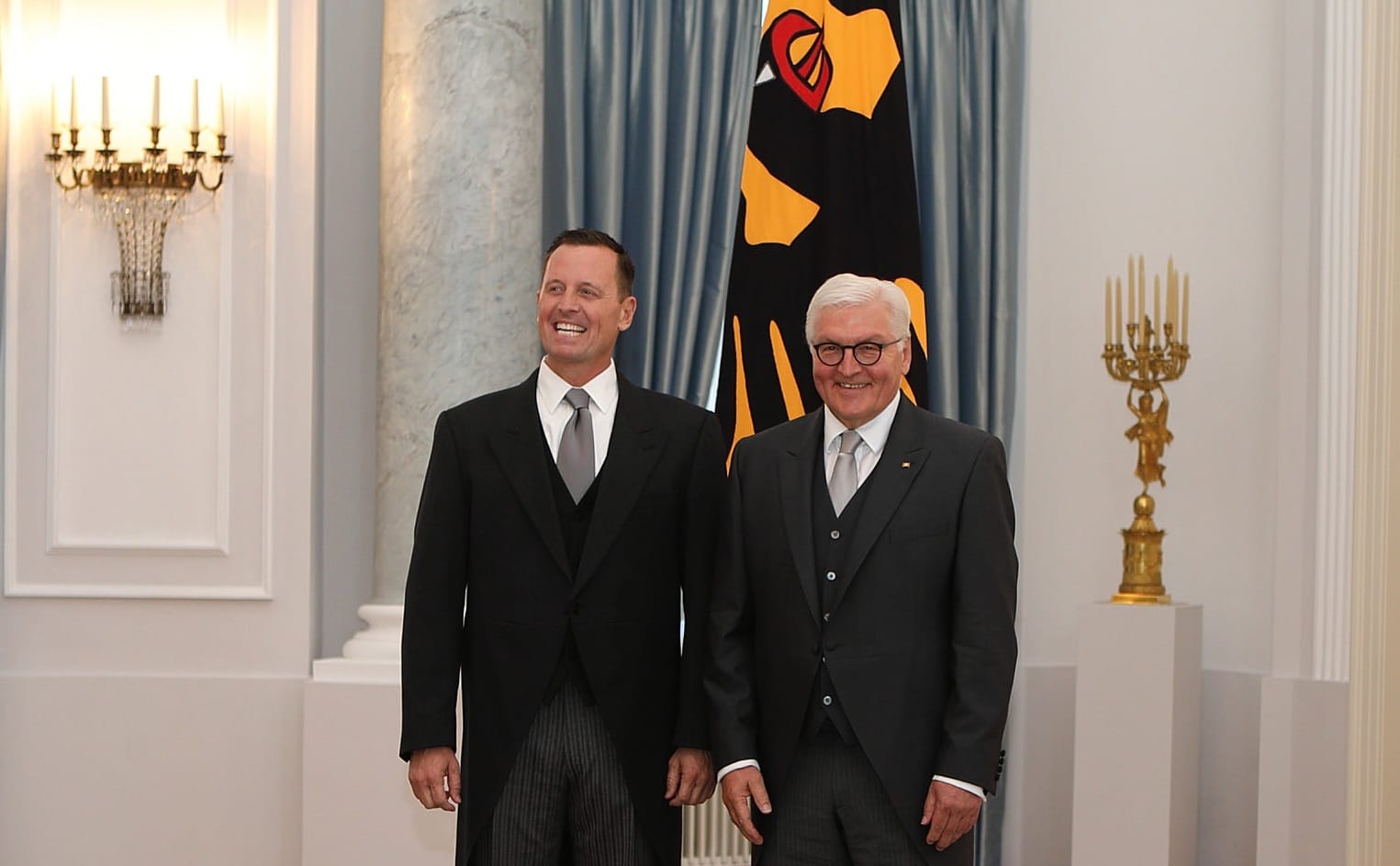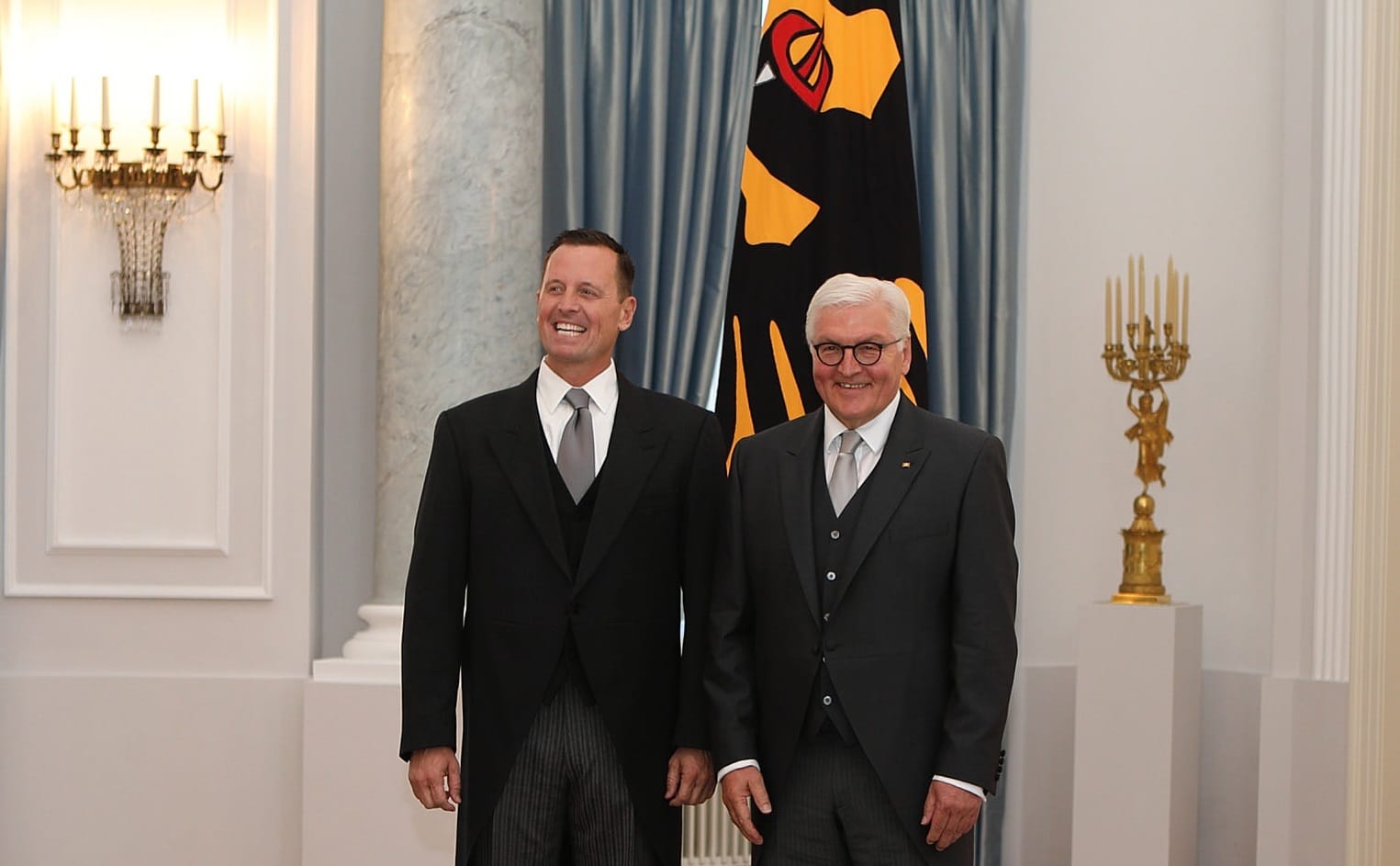Ambassadors have existed since the time of the ancient Greeks. They were from the beginning granted a special immunity which enabled them to talk to enemy spokesmen to attempt to resolve issues without resort to arms. In the modern context, Ambassadors are sent to reside in foreign capitals to provide some measure of protection for traveling citizens and also to defend other perceived national interests. Ambassadors are not soldiers, nor are they necessarily the parties of government that ultimately make decisions on what to do when dealing with a foreign nation. They are there to provide a mechanism for exchanging views to create a dialogue while at the same time working with foreign governments to avoid conflict, whether over trade or politics.
There has been a great deal of discussion in the European press about the new American Ambassador to Germany Richard Grenell. Grenell, a protégé of National Security Adviser John Bolton who doesn’t speak German, would seem to have enough on his plate defending the unpopular Trump Administration decisions on climate change, the Iran nuclear deal and on tariffs directed against European Union exports, but he has apparently gone out of his way to make the bilateral relationship with a key ally even worse. After the White House withdrew from the Iran agreement, Grenell tweeted that German businesses should “wind down operations immediately” in Iran. The ineptly worded advice was inevitably taken by the Germans as a threat. He has also celebrated anti-immigration sentiment in Europe, a slap at German Chancellor Angela Merkel, and breached protocol by meeting with Israel’s Benjamin Netanyahu, who was on a state visit.
Nils Schmid, a German Social Democratic Party foreign policy spokesman, goes so far as to say that “He does not understand what the role of an ambassador should be. An ambassador is a bridge-builder who explains how American politics works, how the American government works, and at the same time explains to America how Germany sees things.” Grenell has, however, “defined his role for himself, and it is not the traditional role of an ambassador. … He will work as a propagandist [for Donald Trump]”
To be sure, Grenell is not unique. There is a long history of incompetent or unwelcome US Ambassadors, particularly in the prestige posts like Paris or London, which have long since been awarded to political cronys and campaign donors. One recalls passionate Irish nationalist Joe Kennedy being sent to London by Franklin D. Roosevelt in 1938. Kennedy took every opportunity to offend his British hosts, particularly over their relationship with Germany. He opposed financial and military aid to London after war broke out and was greatly disliked. FDR finally had to recall him in 1940.
More recently, some US Administrations have sought to use Ambassadors to interfere openly in local politics, which goes well beyond acceptable exchanges of points of view that are part and parcel of diplomatic relations. In particular, a number of American Ambassadors have been sent overseas to confront the existing government and to “promote democracy,” that infinitely flexible concept that can be used whenever Washington is seeking to bully a foreign government.
Syria is a prime example of US interference-by-ambassador. Syria-phobia goes back to the George W. Bush Administration in December 2003, when Congress passed the Syria Accountability Act, House Resolution 1828. Damascus at that time was already in the crosshairs of two principal American so-called allies in the region, Israel and Saudi Arabia. Both were actively working to destabilize the regime.
The drive to “get” Syria has remained a constant in American Foreign Policy to this day. In 2010, when the US still had an Embassy in Damascus, President Barack Obama maladroitly sent as Ambassador Robert Ford. Ford actively supported the large demonstrations by anti-regime Syrians inspired by the Arab Spring who were opposed to the al-Assad government and he might even have openly advocated an armed uprising, a bizarre interpretation of what Ambassadors are supposed to do in a foreign country. He once stated absurdly that if the US had armed opponents of the regime, al-Qaeda groups would have been “unable to compete.” Ford was recalled a year later, after being pelted by tomatoes and eggs, over concerns that his remaining in country might not be safe, but the damage had been done and normal diplomatic relations between Damascus and Washington have never been restored.
And then there is the case of Russia. The neoconservatives and their neoliberal allies have both long been dreaming of regime change for Moscow, either because it is perceived as a threat or as an unacceptable autocracy. The Obama era 2010 appointment of Stanford Academic and Russia expert Michael McFaul as Ambassador was intended to “reset” the bilateral relationship while also pushing the democracy promotion agenda and confronting various aspects of the domestic policies of the Vladimir Putin government that were considered unacceptable, to include the treatment of homosexuals. Pursuing that end, McFaul made a point of meeting with the political opposition in Russia. He thereby antagonized the officials in the government that he should have been working with and his term of office was an embarrassing failure.
Finally, there is Ambassador David Friedman in Israel, who represents the Israeli government more than that of the United States. He recently told journalists to “shut their mouths” when they dared to criticize the Israeli slaughter of Palestinians in Gaza. Friedman is a passionate supporter of the Israeli settlers’ movement, which is considered illegal by everyone but Israel, and has succeeded in changing the US government language used to describe the Israeli control over the Palestinian West Bank from “occupied” to “disputed.”
Friedman is backed up by the reliably pro-Israel Nikki Haley, whom I have discussed in some detail. She is the preferred presidential-candidate-in-waiting of the neoconservatives, so, unfortunately, we Americans will have to suffer more of her in the future.
Beyond the Ambassadors themselves, America’s roving mischief makers have included the State Department’s Victoria Nuland in Ukraine and various Senators named McCain and Graham who have showed up regularly in troubled regions to harass the local authorities.
To put it mildly, clueless and agenda-driven Ambassadors are not what US diplomacy should be all about. An Embassy serves as a two-way channel to exchange views and protect interests. It is part of a process whereby no one wins everything while no one loses completely, producing a result that everyone can live with. It is not about “We are right. Take it or leave it” but rather “We have to coexist, so let’s work something out.”
Reprinted with permission from American Herald Tribune.
*(Ambassador Richard Grenell with German President Frank Walter Steinmeier. Image credit: usbotschaftberlin/ flickr)


